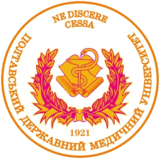Будь ласка, використовуйте цей ідентифікатор, щоб цитувати або посилатися на цей матеріал:
http://repository.pdmu.edu.ua/handle/123456789/17422Повний запис метаданих
| Поле DC | Значення | Мова |
|---|---|---|
| dc.contributor.author | Orlova, Y. A. | - |
| dc.contributor.author | Hromova, A. M. | - |
| dc.contributor.author | Kaidashev, I. P. | - |
| dc.contributor.author | Shlykova, O. A. | - |
| dc.contributor.author | Izmailova, O. V. | - |
| dc.contributor.author | Martynenko, V. B. | - |
| dc.contributor.author | Орлова, Юлія Андріївна | - |
| dc.contributor.author | Громова, Антоніна Макарівна | - |
| dc.contributor.author | Кайдашев, Ігор Петрович | - |
| dc.contributor.author | Шликова, Оксана Анатоліївна | - |
| dc.contributor.author | Ізмайлова, Ольга Віталіївна | - |
| dc.contributor.author | Мартиненко, Віталій Борисович | - |
| dc.date.accessioned | 2022-01-12T12:37:59Z | - |
| dc.date.available | 2022-01-12T12:37:59Z | - |
| dc.date.issued | 2021-09 | - |
| dc.identifier.citation | Pathogenetic role of macrophage colony-stimulating factor (csf-1) in predicting endometrioid disease / Y. A. Orlova, A. M. Hromova, I. P. Kaidashev [et al.] // Wiadomości Lekarskie. – 2021. – Vol. LXXIV, issue 8. – P. 1939–1944. | uk_UA |
| dc.identifier.issn | 0043-5147 | - |
| dc.identifier.uri | http://repository.pdmu.edu.ua/handle/123456789/17422 | - |
| dc.description.abstract | The aim: To assess the CSF – 1 level in peritoneal fluid and menstrual blood of women with endometrioid disease and to investigate its diagnostic and prognostic specificity. Materials and methods: The study included 80 women of child-bearing age (mean age 30.95 ± 6.49 years) with benign gynaecological pathology of the ovaries and / or fallopian tubes. The women included in the study were divided into two groups: study group (n = 50, mean age 31.04 ± 6.3 years), consisting of patients with confirmed endometrioid disease, and control group (n = 30, mean age 30.8 ± 6.8 years), involving individuals without signs of endometriosis (p> 0.05). Results: We have found significantly higher level of CSF-1 content in the peritoneal fluid in the subjects of the study group (2027.05 ± 732.64 pg / ml) compared with those in the control group (1725.62 ± 466.06 pg / ml) (p = 0.029). There is a tendency towards an increase in CSF-1 level in women with endometriosis in its more severe stages and more severe and extended adhesions. The investigation of CSF-1 content in menstrual blood has demonstrated significant increase in its values in the women of the study group (9431.6 ± 2866.22 pg / ml) compared with the values in the control group (6637.12 ± 954.05 pg / ml), (p = 0.00004). Thus, there is a tendency towards the growth in CSF-1 level in peritoneal fluid and menstrual blood in women with endometriosis and concurrent increase in severity of the disease. Conclusions: There has been found significant increase in CSF-1 content in women with endometrioid disease in both peritoneal fluid and menstrual blood (1.2 and 1.4 times, respectively). Thus, macrophage growth factor (CSF-1) can be used as a diagnostic and prognostic criterion in evaluating the progression of endomertioid disease | uk_UA |
| dc.language.iso | en | uk_UA |
| dc.publisher | Aluna Publishing | uk_UA |
| dc.subject | endometriosis | uk_UA |
| dc.subject | peritoneal fluid | uk_UA |
| dc.subject | menstrual blood | uk_UA |
| dc.title | Pathogenetic role of macrophage colony-stimulating factor (csf-1) in predicting endometrioid disease | uk_UA |
| dc.type | Article | uk_UA |
| dc.identifier.doi | 10.36740/WLek202108128 | - |
| Розташовується у зібраннях: | Наукові праці. Кафедра акушерства і гінекології № 1 | |
Файли цього матеріалу:
| Файл | Опис | Розмір | Формат | |
|---|---|---|---|---|
| Pathogenetic_role.pdf | 903,56 kB | Adobe PDF | Переглянути/Відкрити |
Усі матеріали в архіві електронних ресурсів захищені авторським правом, всі права збережені.



